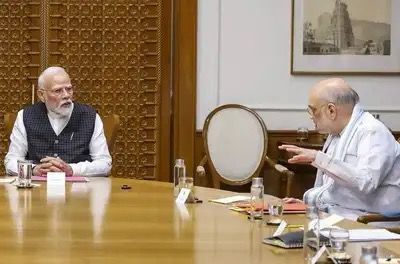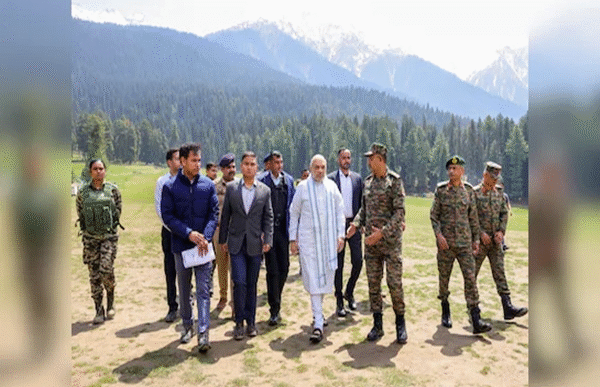On April 22, 2025, Pahalgam Terror Attack: A horrific terrorist attack in Jammu and Kashmir’s Pahalgam claimed 26 lives, mostly tourists, shaking the nation. The Resistance Front, linked to Pakistan-based Lashkar-e-Taiba, claimed responsibility. In response, India’s Cabinet Committee on Security (CCS), led by Prime Minister Narendra Modi, announced a series of strong measures against Pakistan on April 23, 2025. Here’s a breakdown of the five major decisions and what they mean.
5 Key Decisions on Pahalgam Terror Attack
1. Shutting Down the Wagah-Attari Border
India has closed the Wagah-Attari border, a key crossing point for trade and travel between India and Pakistan, effective immediately. People who have already crossed with valid documents can return to Pakistan by May 1, 2025. This closure halts all movement of goods and passengers, impacting trade worth ₹3,886.53 crore in 2023-24 and symbolic events like the daily border ceremony. It’s a clear signal to Pakistan that India is tightening the screws.
2. Suspending the Indus Waters Treaty
The Indus Waters Treaty, a 1960 agreement brokered by the World Bank, governs water sharing of the Indus River system between India and Pakistan. India has now suspended this treaty, stopping the flow of 39 billion cubic meters of water annually to Pakistan until it ends support for cross-border terrorism. This move could hit Pakistan’s agriculture hard, especially as it already faces water shortages due to climate change and mismanagement.
3. Expelling Pakistanis Under SAARC Visa Scheme
India has cancelled all visas issued to Pakistani nationals under the SAARC Visa Exemption Scheme (SVES), which allowed certain dignitaries like officials, judges, and journalists to travel without standard visas. Any Pakistanis in India under this scheme must leave within 48 hours. This decision cuts off cultural, religious, and professional exchanges, sending a strong message against Pakistan’s alleged role in the attack.
4. Reducing High Commission Staff
India and Pakistan will reduce their diplomatic staff in each other’s high commissions from 55 to 30 by May 1, 2025. These downsizing limits diplomatic interactions and reflects a significant downgrade in bilateral ties. It’s part of India’s strategy to isolate Pakistan diplomatically until it takes credible action against terrorism.
5. Expelling Pakistani Defence Attachés
India has declared Pakistani defence, naval, and air attachés at the High Commission in New Delhi persona non grata, giving them one week to leave. In return, India is withdrawing its own defence officials from Islamabad. This move ends military-level diplomatic exchanges, further straining relations. It underscores India’s resolve to hold Pakistan accountable for the attack.
Why These Steps Matter
These decisions mark a historic low in India-Pakistan relations, targeting Pakistan’s economy, diplomacy, and cross-border movement. The CCS, attended by key figures like Home Minister Amit Shah and Defence Minister Rajnath Singh, emphasized that the attack was linked to Pakistan and timed to disrupt Jammu and Kashmir’s progress after successful elections. India’s actions aim to pressure Pakistan to stop supporting terrorism while showing the world its firm stance.
What’s Next?
India has vowed to pursue the attackers and their sponsors relentlessly, with security forces on high alert and over 1,500 people detained for questioning. The Jammu and Kashmir police have offered a ₹20 lakh bounty for information on the terrorists, believed to include four to five Pakistanis. Meanwhile, global leaders from the US, Russia, and China have condemned the attack, and Pakistan’s Prime Minister Shehbaz Sharif has called a National Security Committee meeting to respond to India’s measures.
Also Read: Japan-India Trade: Japanese Delegation Explores Investment Opportunities in Mangaluru
FAQs
1. Why did India suspend the Indus Waters Treaty?
India suspended the treaty to pressure Pakistan to stop supporting cross-border terrorism, as the Pahalgam attack was linked to Pakistan-based groups. The suspension cuts off a critical water supply, impacting Pakistan’s agriculture and economy.
2. How will the Wagah-Attari border closure affect trade?
The closure halts all trade and passenger movement through the border, which handled ₹3,886.53 crore in trade in 2023-24. It disrupts imports, especially from Afghanistan, and ends people-to-people exchanges, including the iconic border ceremony.
India’s response to the Pahalgam attack is a bold step toward accountability and deterrence. As tensions rise, the world watches how Pakistan responds and whether these measures will curb terrorism in the region.

















